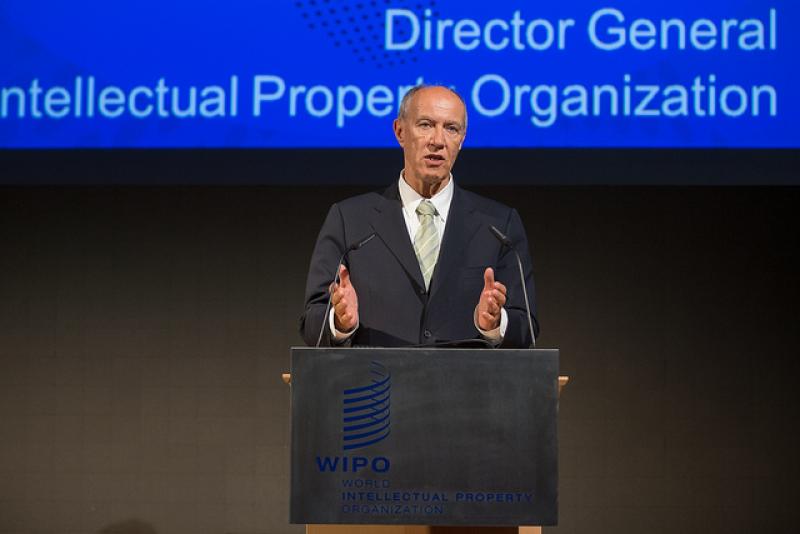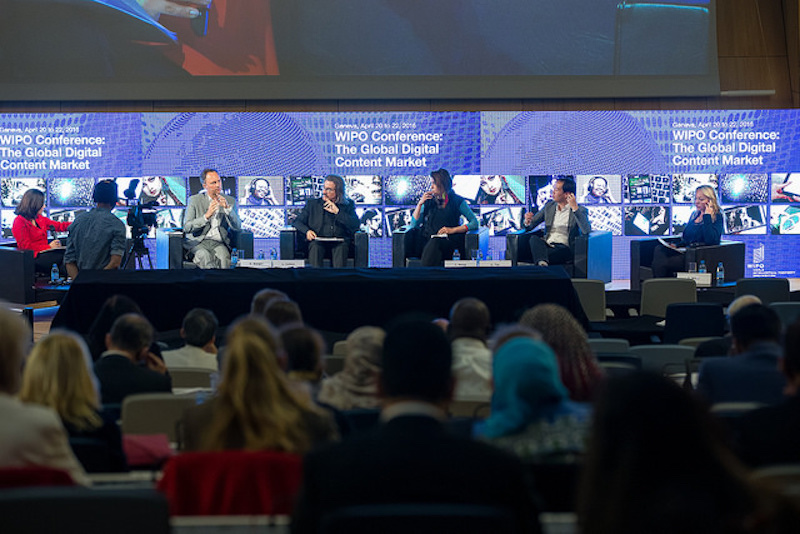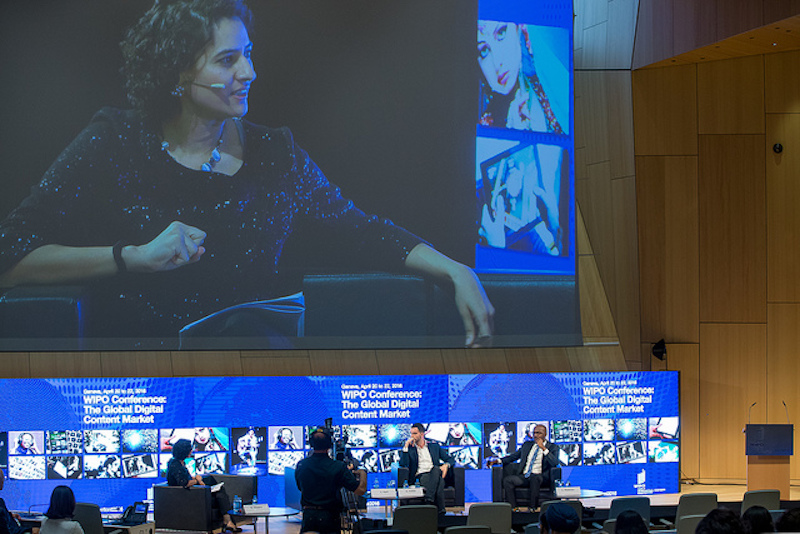Digital demands: time for artists to speak up? | reviews, news & interviews
Digital demands: time for artists to speak up?
Digital demands: time for artists to speak up?
Intellectual property expert Francis Gurry seeks solutions for creatives in the internet age

Galloping technological change, collapsing incomes and a climate of violence facilitated by anonymity are just a few of the challenges facing creative artists in today's digitally driven world. What can be done to put all this right? The man to ask is Francis Gurry, director general of the World Intellectual Property Organisation.
In April, Gurry, an Australian lawyer who has been head of WIPO since 2008, convened an international conference to explore the challenges and pitfalls of the current global digital content models, and seek possible solutions for the future. Not least, he says, artists must shout about their rights.
JESSICA DUCHEN: Why are you holding this conference and why now?
FRANCIS GURRY: The internet has been with us for 20 years. But some of the new accessible business models, or business models which give access at formal cost – streaming and subscription – are only two or three years old. That’s relatively new. Also, I think there is a heightened consciousness of the global nature of the marketplace. Everyone has focused on the impact of the technology on business and the creative sector for a long while, and I think now people are generally aware that technology has created a global space, whether we like it or not. But our copyright system is territorial. Therefore the mechanics of the system have quite a lot of adjustment to make.
I don’t think there are many international fora for a discussion of these issues. There is a lot of discussion at national levels, of course, but I don’t know of another international forum that is bringing different countries together. Some developing countries have huge markets, and there is a shift in demography that I think is also happening in creative works. India has a huge audiovisual industry, and very big music and publishing industries too. China has huge industries in those areas, as do Japan and Korea. It's important, I think, that we have an international place to discuss a global phenomenon. The impact of digital technology and the internet really is similar in all countries, even though they may be at different stages of development in their response to it. (Music panel at the WIPO pictured below)
 When technology moves forward at such a rate, how can the old structures we work with in publishing and music keep up with it?
When technology moves forward at such a rate, how can the old structures we work with in publishing and music keep up with it?
That’s another reason for the conference. There’s a certain non-transparency about what’s happening, not because there’s a desire to be non-transparent and hide things, but because it’s happening so quickly. Development follows development at such a pace that you can’t absorb it before what happens next. The late Tony Judt once wrote that we’re losing our memory, because there’s no time to absorb what’s happening before you move on to the next thing, so it doesn’t become embedded. That’s a very good point. The non-transparency is non-deliberate, but that’s a good reason to try to understand the value chains, from production to consumption, of all of these developments.
Anonymity is a huge problem on the internet, facilitating destructive forces from piracy to trolling, all of which affect artistic creators. Can you do anything to make it harder for this to continue?
I fought a long battle about anonymity online. At the end of the 1990s, around 1997, we were looking at disciplinary procedures for cybersquatting, or taking someone else’s name or identity and registering it as a domain name. At the time the argument in favour of anonymity was that some political dissidents need it. But I think you could have satisfied that demand without allowing anonymity for everyone. We could have found ways of dealing with it; e.g. we could have had one domain in which anonymity was allowed and you would know that if you go there it’s a risky environment because you don’t know who you’re dealing with. You can’t set up a physical shop and go in and sell things without revealing your identity. So I have a lot of sympathy with the requirement for identification, although it’s extremely unpopular with the internet community, whatever that might be.
Part of the mid to late 1990s was about enchantment with the technology, a feeling of “Don’t touch it, you’ll wreck it”. A very anti-regulation culture prevailed. I understand that with a global medium, if you have too much regulation you’re going to have chaos because there’ll be different regulation in different countries, so we do have to be careful and sensitive to this question. But there are limits – child abuse is one. So there must be some form of regulation that is permissible.
Do you think it might be possible to change it now and recognise that a tipping point has reached where it’s got to be dealt with?
Difficult, very difficult. I think you could contemplate taking the opposite approach to the one I mentioned earlier about having one domain where people could be anonymous. You could also have clean domains so you know that when you go there, there is identification and people do agree to give their details. You go into the other ones at your own peril, but you have a choice. This might be better than the present system. I think it’s difficult to contemplate change, especially as there is such a great sensitivity to anything that involves regulation.
Have you spoken to people around the world in controlling positions about this? What kind of response emerges?
I’m not sure that the internet commands the level of high-level policy attention that it should. You don’t see many heads of government speaking about the internet. Partly that’s because it’s a politically dangerous thing to do; if you talk about the internet you will be attacked. So I think we have to proceed extremely cautiously. It’s a wonderful thing and we have to be careful not to destroy it, and not to destroy its productivity and the many advantages it gives for freedom of expression. We have to be sensitive and try to get a consensus about where we can reform it. (Francis Gurry pictured below)
 Many musicians, writers and other creators have found their incomes plummeting because now people are used to hearing music and reading for free online. Is it possible to re-educate consumers in the realities of the time, effort and expertise that goes into these creations and the fact that artists have to make a living, otherwise there will be no new work for anybody to experience?
Many musicians, writers and other creators have found their incomes plummeting because now people are used to hearing music and reading for free online. Is it possible to re-educate consumers in the realities of the time, effort and expertise that goes into these creations and the fact that artists have to make a living, otherwise there will be no new work for anybody to experience?
I think we have to fight that battle. We absolutely have to. I think it’s a general economic question in the knowledge economy. There is great value now in intangibles, and intangibles are increasingly a source of wealth generation. It requires a big mental shift for everyone to recognise that. Creative works are one subset, but a very important one, and in one sense we should have the most success with creative works because they have such obvious social and cultural benefits. It’s not just economics. They are huge enrichments of our lives.
In addition, there has been extraordinary progress for the consumer in the past 20 years, the legal consumer, not to mention the illegal consumer. For example, just before commercial activity was permitted on the internet in 1995, it cost the consumer roughly $30 to buy a CD of 12-15 songs; now, for between $10 and $15 per month you can get access to millions of songs. So that’s a very good deal – extraordinary progress for the legal consumer, amazing and astonishing. But tickets for some premiership football clubs have more than trebled in the same time and there are no demonstrations in the street about that. Yet there is a lot of noise about free access to culture.
So how are we going to finance cultural production at the base in the digital environment? Copyright has been the major mechanism that’s been used. You could use patronage, which went out several centuries ago in a major way; you could have state ownership, but that has not proved successful; so you’re left with copyright as the major interface between the creative world and the main economy and the way of monetising creative works.
It is an important institution and we have to be able to answer that question satisfactorily because the overall economic value, resting in crude material terms, is extraordinary in the creative industries. In London, one survey done by Ernst and Young at the end of last year said that there are 29.5 million jobs in the creative industries worldwide and $2.2 trillion in revenue is generated, so economically there’s a big interest in this, and that’s where I think politicians will pay attention: to GDP and economic growth. But we can go beyond crudely material terms to the extraordinary enrichment of our lives and the transmission of information from one generation to another in education. It’s extraordinary, the social, cultural and economic implications of what is happening in terms of the digital transformation. I, personally but naturally, sitting where I am, think it's a no-brainer. We have to do something about it.
New business models such as streaming and subscription do seem to be increasing digital sales. So one answer to compliance – though not the complete answer – is accessible business models. But you need to add to that a cultural adaptation, so that people appreciate that taking copies free is not victimless. It does have consequences. The taking of the copy is immediate gratification, but the consequences are longer term in its impact on the economic sustainability of the creators.
There are some measures that can be taken to persist with all of that. In the UK, for example, you can get an injunction to block access being given by a service provider to an overseas pirate website. So there are legislative supports as well. I think you need a composite approach with all of those things; one alone is not going to solve the problem. But perhaps the most important is the cultural appreciation of the value of creative works and the economic necessity of finding a model that does return value to the creators.
We have to develop a greater sense of urgency about these questions I think another set of questions involves the impact on the distribution of value across the chain. Where is the value being concentrated? A lot say that it’s being concentrated in the distribution function. And many of the great distributors don’t invest in content production. They just distribute it. Henry Thoreau said in the 19th-century US that they’re building a telegraph from Texas to Maine, but it may be that Texas and Maine have nothing to say to each other. The technology’s good, but content is the really important thing.
That’s a question that requires exploration. Some would say yes, OK, all the value is concentrated in the distributions. Spotify says that they pay out 70% of their revenue in royalties, but then performers say, “Well, we’re not getting it”. So what’s happening? Some goes the artists, perhaps, but also some goes to the labels along the way. I think we need to understand the value chain better, and the impact of the value chain.
With technology changing so fast, how are these challenges changing with it? How do you think they’ll develop in the next few years?
We wouldn’t necessarily have guessed that streaming would become a fairly dominant model; nor would you necessarily have guessed that people might subscribe to a website that gives you access to books where you can read up to five at a time and you never buy one. It’s very difficult to predict where it’s going. But we have to develop, I think, a greater sense of urgency about the questions – and those questions are about the value chain, whether there’s value, then the distribution of the value.
I think we also should ask about the complexity of the copyright system. How easy is it to comply? We have built up a very complex architecture behind the copyright system, with the authors, the publishers, the collecting societies; is there any way of simplifying that? Maybe some of the answers will come through technology. There are initiatives around the world, for instance in the UK with the copyright hub, that’s an initiative to facilitate cross-border licensing and ensure that the marketplace can function smoothly.
Some people suggest that blockchain, the technology that underlies Bitcoin, may be something that can be applied to mass licensing. Blockchain is a secure chain of title, so you have security between the operatives, between the parties to a transaction – security in relation to the subject matter of the transaction. That might be a very simplified explanation of the impact of the technology and the possible use it could have. Imogen Heap has released a recording using this. So I think technology can help us in simplifying the rather complex operation of the copyright system. (Conference session at the WIPO pictured below)
 Do you think there can be progress on internet regulation where piracy is concerned, or is it too sensitive and unlikely to happen?
Do you think there can be progress on internet regulation where piracy is concerned, or is it too sensitive and unlikely to happen?
I suppose that this to an extent depends on your philosophy of political economy! There are very different traditions of regulation that exist around the world. For some, the idea really is to let the market achieve the solutions. But there are other traditions equally that feel regulation is a very important thing to ensure the market functions properly from the point of view of competition.
That’s a major question, because competition laws are national, or regional in the case of the EU, and they address a single market, whether it’s national or regional. But here the technology is global, and there’s no competition law that applies to the global market. So we’re a very long way off from being able to address this question, yet we have these giants who are operating in this space – Netflix, Amazon or any of the others. I’m not saying they are anti-competitive, but we haven’t any means for dealing with them if they happened to be anti-competitive, except in one market.
Musicians can get to the audience directly – they don’t need record companies How would you like to see creative artists adapt their own expectations and creativity?
I think it’s important that creators continue to voice their concerns about not getting compensation, an adequate share of the value chain. It’s exceptionally important because without creation nothing else exists. It’s very important that they be organised and vociferous. Consumers have their rights and we all respect them, but there’s nothing to consume without creatives. The consumers are very powerful, so we absolutely should hear from the creatives. The nature of creation is that you don’t want to be concerned with necessary political processes, you’re focused on creation, and this is the dilemma.
In 2010 I was in Nigeria and when I was there the musicians were on hunger strike before parliament because of digital piracy, seeking attention to this. Digital piracy is rife in many places in the world, and it’s extremely important to present that politically and also socially on the net. I don’t know if it had an immediate impact, but there as everywhere, the problem is primarily cultural in the sense of persuading people that there is a reason to pay for creative works; that we do have to find sustainable economic models for the creative industries.
Another point is that musicians can get to the audience directly – they don’t need record companies, and there are some cases of artists who developed a worldwide audience this way. That’s one of the potential democratisation features of the internet that I think is really beneficial.
Musicians are also horribly prone to being trolled – part of a terrible culture of aggression that seems to me to spring largely from the lack of regulation online. What can we do about it?
It’s vicious, really. It isn’t acceptable even within our culture to criticise in the most virulent and frankly antisocial manner without consequence. You can’t do it in the physical world. However, there’s evidence of violence or aggesssion at every single level of society now, in a way I don’t think there used to be. That level of violence is obviously a complex phenomenon. Part of the explanation is this rat race we’ve got ourselves into where everything is so pressed and so stressed and there’s no time – everyone seems to feel this – so there are multiple explosions occurring everywhere, small and big, at every level of society.
In my view it’s also an explanation for the higher degree of mental illness. It’s not a good thing, it’s an acceleration of life, and I think this internet explosion is linked to that. It’s linked to a more general phenomenon where we’re subject to stresses and tensions at a level that is becoming intolerable for people. I think we’re building a grave for ourselves. I do think the internet phenomenon is related to the pressure that everyone is feeling, and the constant emphasis on performance – especially economic perfoprmance – is related to that.
At this conference I don’t think we’re going to solve the level of aggression in society, but I hope we can raise consciousness about the seriousness of the issues around the future of cultural production. We have a community of interests; it’s of international interest that we should have a sustainable community of creative industries, and we must find the right models for that and the right support for it.
Explore topics
Share this article
The future of Arts Journalism
You can stop theartsdesk.com closing!
We urgently need financing to survive. Our fundraising drive has thus far raised £49,000 but we need to reach £100,000 or we will be forced to close. Please contribute here: https://gofund.me/c3f6033d
And if you can forward this information to anyone who might assist, we’d be grateful.

Subscribe to theartsdesk.com
Thank you for continuing to read our work on theartsdesk.com. For unlimited access to every article in its entirety, including our archive of more than 15,000 pieces, we're asking for £5 per month or £40 per year. We feel it's a very good deal, and hope you do too.
To take a subscription now simply click here.
And if you're looking for that extra gift for a friend or family member, why not treat them to a theartsdesk.com gift subscription?
more
 'We are bowled over!' Thank you for your messages of love and support
Much-appreciated words of commendation from readers and the cultural community
'We are bowled over!' Thank you for your messages of love and support
Much-appreciated words of commendation from readers and the cultural community
 Mary Page Marlowe, Old Vic review - a starry portrait of a splintered life
Tracy Letts's Off Broadway play makes a shimmeringly powerful London debut
Mary Page Marlowe, Old Vic review - a starry portrait of a splintered life
Tracy Letts's Off Broadway play makes a shimmeringly powerful London debut
 Music Reissues Weekly: Joe Meek - A Curious Mind
How the maverick Sixties producer’s preoccupations influenced his creations
Music Reissues Weekly: Joe Meek - A Curious Mind
How the maverick Sixties producer’s preoccupations influenced his creations
 Bizet in 150th anniversary year: rich and rare French offerings from Palazzetto Bru Zane
Specialists in French romantic music unveil a treasure trove both live and on disc
Bizet in 150th anniversary year: rich and rare French offerings from Palazzetto Bru Zane
Specialists in French romantic music unveil a treasure trove both live and on disc
 Pop Will Eat Itself, O2 Institute, Birmingham review - Poppies are back on patrol
PWEI hit home turf and blow the place up
Pop Will Eat Itself, O2 Institute, Birmingham review - Poppies are back on patrol
PWEI hit home turf and blow the place up
 Janine Harouni, Soho Theatre review - families and surviving them
US comic's slick show about relationships
Janine Harouni, Soho Theatre review - families and surviving them
US comic's slick show about relationships
 'Fevereaten' sees gothic punk-metallers Witch Fever revel in atmospheric paganist raging
Second album from heavy-riffing quartet expands sonically on their debut
'Fevereaten' sees gothic punk-metallers Witch Fever revel in atmospheric paganist raging
Second album from heavy-riffing quartet expands sonically on their debut
 The Mastermind review - another slim but nourishing slice of Americana from Kelly Reichardt
Josh O'Connor is perfect casting as a cocky middle-class American adrift in the 1970s
The Mastermind review - another slim but nourishing slice of Americana from Kelly Reichardt
Josh O'Connor is perfect casting as a cocky middle-class American adrift in the 1970s
 Scottish Chamber Orchestra, Ibragimova, Queen’s Hall, Edinburgh review - rarities, novelties and drumrolls
A pity the SCO didn't pick a better showcase for a shining guest artist
Scottish Chamber Orchestra, Ibragimova, Queen’s Hall, Edinburgh review - rarities, novelties and drumrolls
A pity the SCO didn't pick a better showcase for a shining guest artist
 Springsteen: Deliver Me From Nowhere review - the story of the Boss who isn't boss of his own head
A brooding trip on the Bruce Springsteen highway of hard knocks
Springsteen: Deliver Me From Nowhere review - the story of the Boss who isn't boss of his own head
A brooding trip on the Bruce Springsteen highway of hard knocks
 theartsdesk Q&A: Soft Cell
Upon the untimely passing of Dave Ball we revisit our September 2018 Soft Cell interview
theartsdesk Q&A: Soft Cell
Upon the untimely passing of Dave Ball we revisit our September 2018 Soft Cell interview
 Little Brother, Soho Theatre review - light, bright but emotionally true
This Verity Bargate Award-winning dramedy is entertaining as well as thought provoking
Little Brother, Soho Theatre review - light, bright but emotionally true
This Verity Bargate Award-winning dramedy is entertaining as well as thought provoking

Add comment